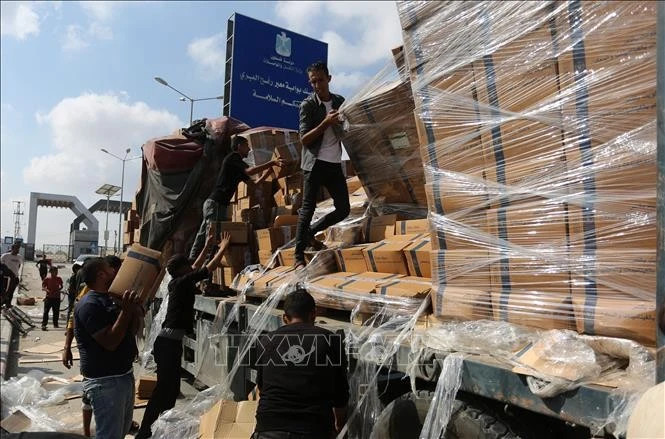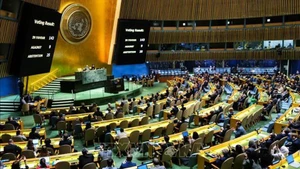Many countries, aid agencies, and humanitarian organisations are working to deliver food to Gaza and are pushing for the opening of more aid corridors to prevent humanitarian disaster in this Mediterranean land
The initiative to open a humanitarian maritime route to Gaza was launched in the context of the conflict between Israel and Hamas entering its sixth month. The project is carried out in coordination among the US-based organisation World Central Kitchen, the United Arab Emirates (UAE), and Spain's Proactiva Open Arms. It is also supported by the Government of Cyprus.
According to the latest announcement from the World Central Kitchen, humanitarian aid has continued to be loaded onto ships at the port of Cyprus to people in the Gaza Strip. About 300 tonnes of humanitarian aid goods were loaded onto ships anchored at the port of Larnaca in Cyprus.
The World Central Kitchen also prepared a roughly 60m wharf in Gaza to receive aid. This is the second ship implemented under the pilot project. The first ship previously left Cyprus carrying 200 tonnes of aid to the Gaza territory.
The pilot initiative to open the sea route to transport emergency supplies is unrelated to the multinational effort to establish a maritime aid corridor to Gaza.
The European Union (EU) has called on Israel to open more border gates in addition to the existing Cyprus maritime corridor in order to increase the amount of aid to the Gaza Strip. Germany has given the "green light" for humanitarian airlift operations to Gaza.
It is expected that two German C-130J Hercules transport aircrafts will participate in the airlift campaign, in which each aircraft can transport up to 18 tonnes of goods.
The humanitarian airlift operation to people in the Gaza Strip was initiated by Jordan and currently features the participation of the UAE, the US, France, the Netherlands, and Belgium. Egypt has coordinated with other countries to continue dropping humanitarian aid into the northern Gaza Strip.
Meanwhile, a complete field hospital funded by the British Government's UK Aid departed from the Port of Manchester for the Gaza Strip. This field hospital has the capacity to treat more than 100 patients per day. The people working here include international doctors, with many from the UK, and local medical staff.
The scale of the hospital will be adjusted depending on actual needs and will include a number of main functional areas such as a medicine dispensing area, a patient triage area, a recovery and severe trauma treatment area, and a maternity care area.
Along with the latest rounds of aid, Britain announced additional aid worth 10 million pounds (12.8 million USD) for the occupied Palestinian territories, bringing total British aid to more than 100 million pounds in the 2024 financial year, helping to respond to the humanitarian crisis in the Gaza Strip.
Four US military ships also left their base in Virginia, carrying about 100 soldiers and essential equipment to build a temporary port on the Gaza coast to deliver emergency aid to Palestinians.
According to the Pentagon, with an offshore floating dock to transfer aid from large ships to smaller vessels and a pier to bring aid ashore, the new facility is expected to be put into operation in 60 days. A total of about 500 soldiers from the 7th Transportation Brigade (Expeditionary) will participate in this campaign.
Once this new facility is operational, it will be able to deliver two million rations ashore each day. US officials said this effort was not related to the deployment of ground aid in Gaza. The “Food for Gaza” initiative was also announced by Italy and three multilateral aid agencies, including the Food and Agriculture Organisation of the United Nations (FAO), the World Food Programme (WFP), and the International Federation of Red Cross and Red Crescent Societies, aiming to coordinate international humanitarian efforts.
The initiative is implemented to increase food and medical aid to the Palestinian territories in the short term, and then will focus on social reconstruction and restoring the lives of people here in the long term.
The initiative also aims to coordinate projects of the three organizations mentioned above and create a humanitarian aid corridor that will be established from Cyprus.
Sweden also decided to resume funding for the United Nations Relief and Works Agency for Palestine Refugees in the Near East (UNRWA), with an initial disbursement of 20 million USD out of a total of 40 million USD in 2024.
Last month, the European Commission (EC) also announced the disbursement of 50 million EUR to UNRWA. As the centre of the efforts to provide humanitarian relief in Gaza, UNRWA is in need of financial support to continue humanitarian activities when the situation in Gaza is currently assessed at an unprecedented level of severity.
In the context of the United Nations warning of the risk of widespread famine in the Gaza Strip if urgent action is not taken, the distribution of humanitarian aid by air and sea contributes to diversifying channels for delivering relief goods to this territory, alleviating the dangerous and tragic situation that the people are suffering.
However, these plans of sending humanitarian aid are only considered temporary solutions that have not solved the core problem. Shipments by air and sea are not enough to alleviate the difficulties and deprivation faced by the people in Gaza.
Road corridors for humanitarian goods entering Gaza need to be opened, especially land border gates in Israel bordering northern Gaza. Road is still considered the optimal option for transporting humanitarian aid into Gaza, thanks to economics and the ability to perform on a larger scale than air and sea.
And more than ever, an immediate ceasefire in Gaza and a comprehensive political solution are needed to end the Israeli-Palestinian conflict and move towards establishing long-term and sustainable peace in the Middle East.
















